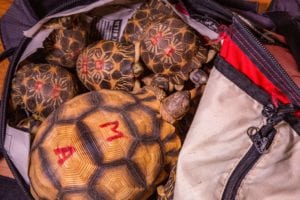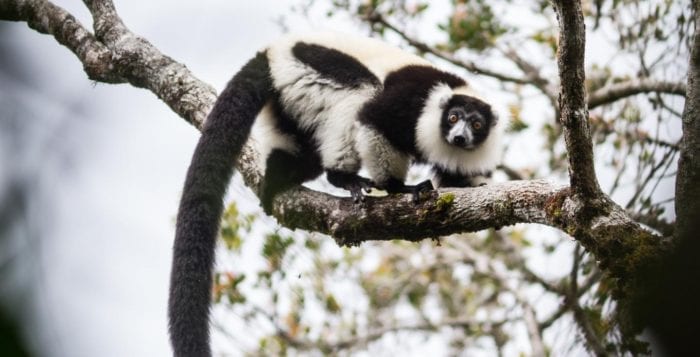By Daniel Dunaief
As a part of an ambitious reforestation plan announced in March, Madagascar’s newly elected president Andry Rajoelina explained that he wanted to change the way his nation off the southwest coast of the African continent was known, from the Red Island to the Green Island.
An international collection of scientists, including lemur expert and award-winning scientist Patricia Wright of Stony Brook University, recently weighed in on other ways Rajoelina can help conservation goals for the country through a five-step solution they outlined in the journal Nature Sustainability.
“We are all very concerned” about the fate of biodiversity in Madagascar, said Wright. “We know that only with a collaborative effort can we push things in the right direction.”
Madagascar, which has numerous species endemic to the island nation, including many of the lemurs Wright studies, is known as the island of red clay in part because deforestation has exposed much of the clay underlying the country. This clay has eroded into rivers, which have washed into the ocean.
“If you flew over the whole island, it would be very sad” because of all the exposed red clay from deforestation, Wright said.
She remains optimistic about Rajoelina’s goals and the potential for achieving them. The president “talked about going on the offensive and reforestation is one of his platforms,” she said. “It’s most important to reforest with endemic species,” as opposed to eucalyptus and pine.
Unlike in other countries, where politicians sometimes view conservation and economic development as forces pulling in opposite directions, Malagasy leaders acknowledge and recognize the benefit of preserving unique habitats that are home to the rare and threatened species of Madagascar.
“If you destroy all the forests, you destroy all the water and they will no longer be able to farm,” Wright said. “The natural wildlife and habitats are closely connected to their well-being. One of the biggest industries is ecotourism, which supports many industries on the ground. It’s not like there’s a line between people and wildlife.”
Indeed, the scientists acknowledge the importance of financial growth for the country that dovetails with their conservation goals.
“Conservation needs to contribute to, and not detract from, national efforts targeting economic development,” Julia Jones of Bangor University, in Wales, who led the study, said in a press release. “It must not make situations worse for the rural poor who are so often marginalized in decision making.”
The people of Madagascar have many of the same needs as those in other countries, as they seek jobs, health care, and good schooling, Wright said. “These families are closer to not having enough food to eat and they are much poorer if the natural resources are all destroyed.”
Concerned about the fate of biodiversity in Madagascar, Jones contacted Wright, who suggested the team enlist the help of Jonah Ratsimbazafy from the University of Antananarivo in Madagascar.
“It was just a matter of bringing together some of the key players in conservation for 20 years,” explained Wright.
The group generated a list of five priorities.
First on the list is tackling environmental crime. The scientists suggest using new technologies, including remote sensing and rapid DNA barcoding, to allow forest rangers and others to identify protected species. To improve this effort, however, the Ministry of Justice also needs to enhance the way it reacts to environmental crimes.
The researchers suggest prosecuting and fining those who traffic in rosewood or the critically endangered species for the pet trade. They see progress in this arena in the northeastern part of the island nation, where prosecutors have effectively charged some people who have sold rosewood.
Second, the group recommends investing in protected areas. The researchers urge greater investment in policy, legal and economic conditions that encourage additional investment in nature, which could include improving infrastructure to develop tourism around protected areas, payment for ecosystem services and debt for nature swaps.

Third, the scientists urge that major infrastructure developments limit the impact on biodiversity. The current environmental impact assessment law is over 20 years old and needs an update to require the use of environmental assessment. This component also includes a greater commitment to enforcement.
Fourth, the scientists suggest strengthening tenure rights for local people over natural resources. Most farmers can’t get certification for their land, which reduces the incentive for them to invest in settled agriculture and potentially exacerbates forest clearance. A review of tenure laws could help local landowners and biodiversity.
Finally, researchers recognize a growing crisis in fuel wood. They urge an investment in reforestation efforts, which could provide environmental and economic benefits.
While these steps are important for Rajoelina and the government in Madagascar, Wright suggests several ways Long Islanders can help. She urges school teachers to cover Madagascar in their classes. Teachers in the area who are interested in gathering information about the island nation can write to Wright at [email protected].
She also urges people to become involved through social media, which they can use to have fundraisers through organizations like PIVOT, an organization committed to improving health in developing nations like Madagascar and strongly encourages people to visit Madagascar, where they can enjoy the benefits of ecotourism.
Visitors to Madagascar would have the incredible opportunity to witness the varied biodiversity for themselves.“We have charismatic lemurs,” Wright said, although many of them are critically endangered. Even if they can’t travel that far, people can support students who wish to study abroad.
“I don’t think health and wildlife are separated,” Wright said. “The health of the people depends on us preserving natural resources.”
She is looking forward to the Annual Association for Tropical Biology and Conservation meeting in Antananarivo, Madagascar, from July 30 through August 3. “Hopefully, we will be going forward with the next step during or shortly after that meeting.”





